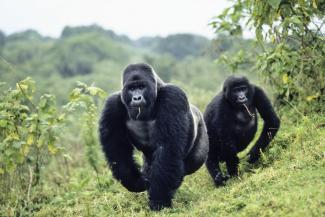Forest
Endangered world heritage

The current debate in the DRC Parliament is basically about the Virunga National Park in the east of the country. Vast natural resources are believed to be in its ground. On the other hand, the Park of 780,000 hectares was made a UNESCO World Heritage Site in 1979. It is the habitat of many rare species, including the endangered mountain gorillas.
Protecting the National Park was always a challenge. It is located in a region repeatedly hit by crises. During the genocide in Rwanda in 1994, masses of refugees fled to the Virunga Park. Various militias, including most recently the rebel movement M23, have used it to hide. Some 300 park rangers, moreover, are no match for poachers who are more numerous and better equipped. Some 140 rangers have been killed since 1996.
New danger is brewing up now. Major corporations have become aware of the Virunga Park's oil resources. As early as 2007, the DRC government gave European companies such as Britain-based Soco International and France-based Total exploration rights. Oil production inside the Park is still illegal however – which is something the government wants to change.
In spite of massive protests internationally, it sent a reform draft to Parliament for approval. Legislators must now decide whether economic benefits or environmental and social downside matter more. There are indeed serious downsides:
- Oil exploration and production can easily tip the balance of sensitive eco-systems. Forest will have to be cut down for the sake of infrastructure facilities. Animal-welfare activists warn, moreover, that more people in the Park will mean more threats to endangered species, because of noise and diseases for instance.
- Local people who basically depend on fisheries and agriculture fear that land and water will be contaminated in ways that would destroy their livelihoods. They don't believe they will get any compensation. Similar cases in other countries have shown that resource extraction is typically done at the expense of the local population. In many people's eyes, moreover, it is an indication of the DRC being exploited by foreign powers that European countries would use the oil for energy generation.
- Security risks are considerable too. Oil production would probably stimulate more rebel activity. Militias could try to get control of production facilities or blackmail staff in order to benefit from the oil business. The DRC's relations with Uganda and Rwanda might be strained too.
It is possible to escape the dilemma. The DRC should do more to benefit from Virunga National Park in economic terms. For instance, eco-tourism would be an option. The DRC's lawmakers could take such an approach and safeguard the unique habitat by not passing the government's reform proposal. In turn, the government would have to rise to its duties and stop exploration inside the national parks.
The international community should exert pressure on Kinshasa too, insisting on the protection of the World Heritage Site. Its means are limited however. UNESCO has no way of sanctioning a country, and it would be counter-productive to block funding for nature protection. Accordingly, it matters to appeal to the sense of responsibility of the corporations involved, including, for instance, German companies such as Deutsche Bank, which owns Soco-International shares. German policymakers should ask the managers to prioritise the protection of Virunga National Park. According to the World Heritage Convention, the Virunga Park is so important that it must be protected for humanity's sake.
Sarah Luisa Brand works for the Ecumenal Network Central Africa (ÖNZ), an umbrella organisation of various German church-based organisations that campaign for peace and human rights in Africa's Great Lakes region.
Ilona Auer-Frege heads the ÖNZ.
office@oenz.de







